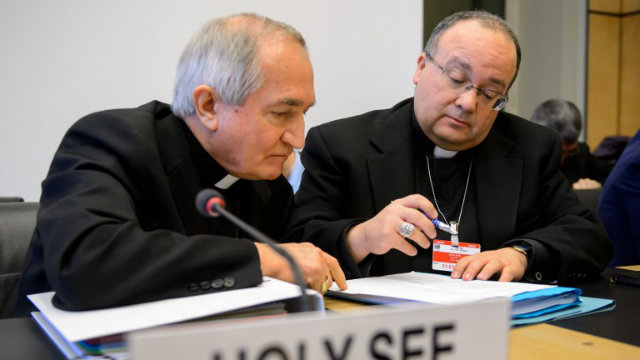SUMMARY
This is AI generated summarization, which may have errors. For context, always refer to the full article.

GENEVA, Switzerland – (UPDATED) The Vatican was pushed for the first time to provide answers to the UN over its commitment to stamp out child sex abuse by priests on Thursday, January 16.
The landmark question-and-answer session before the UN’s child rights watchdog in Geneva came as Pope Francis said Catholics should feel “shame,” in an apparent reference to the scandals that have rocked the Church.
Francis has vowed zero tolerance of abuse, setting up a special committee to investigate sex crimes, enforce prevention and care for victims.
But top officials at the United Nations Committee on the Rights of the Child questioned the Vatican’s resolve.
“The Holy See has not established any mechanism to investigate those accused of perpetrating sexual abuse, nor to prosecute them,” charged committee member Sara Oviedo.
The Roman Catholic Church has been shaken by a decade-long cascade of scandals involving child abuse by priests and Catholic lay officials, from Ireland to the United States and Australia.
Pressed for details of the Vatican’s new committee, its UN ambassador, Monsignor Silvano Tomasi said the ground rules and membership were still being established.
Oviedo also quizzed the Vatican on specifics, demanding to know what it was doing in the case of Archbishop Jozef Wesolowski, a papal envoy from deeply Catholic Poland recalled from the Dominican Republic amid claims of abuse.
Monsignor Charles Scicluna, the Vatican’s former top prosecutor, insisted the Church understood what it had to do.
“The Holy See gets it, that certain things have to be done differently,” he said.
“It’s not words, it has to be commitment on the ground, on the level of the local churches,” he told the panel.
But committee member Hiranthi Wijemanne said perpetrators were too often shielded by their hierarchy.
“Why is there no mandatory reporting to a country’s judicial authorities when crimes occur?” she asked. “Taking actions against perpetrators is part of justice.”
Past cases of abuse were often covered up by priests’ superiors, who typically transferred offenders to new parishes, rather than turn them over to police.
Scicluna insisted there was no conspiracy of silence.
“It is not a policy of the Holy See to encourage cover-ups,” he said. “Our guideline has always been that domestic law of the countries where the churches operate needs to be followed.”
Like other signatories of the 1989 UN Convention on the Rights of the Child, the Vatican agrees to submit regular reports on its respect for the rules, and to be scrutinised by an 18-member panel.
Thursday’s session marked the Vatican’s second appearance before the committee. The first was in 1995, before the abuse cases burst into the spotlight.
‘It’s a test of the new pope’
Benedict XVI, pontiff from 2005 to 2013, was the first pope to apologise to abuse victims and call for zero tolerance.
Pope Francis alluded to the abuse revelations in a homily on Thursday, as “the shame of the Church.”
“Do we feel shame? There are so many scandals that I do not want to name them individually but everyone knows about them!” said the pope.
But campaign groups say the pope’s “lofty words” have so far made little difference to victims.
“When is it going to start, what’s going to happen?” Mary Caplan, UN representative of US-based global network SNAP (Survivors’ Network of those Abused by Priests), told AFP.
“Nothing’s changed,” SNAP president Barbara Blaine charged before reporters, citing two benchmarks for judging the Vatican.
“Number one is, are they turning the evidence of sex crimes over to the police? And number two, are they punishing any of the bishops who have enabled and covered up for the sexual predators?
“That would give me hope that children would be protected in our church. But they fail to do either one.”
Tomasi said the Vatican was serious about fighting abuse.
“For the Holy See, the whole problem is a wound that hurts the Church as a community of faith,” he said.
“The Holy See has carefully delineated policies and procedures designed to help eliminate such abuse and to collaborate with respective state authorities to fight against this crime,” he said.
But he argued that the Holy See’s powers were limited given that it was legally responsible only for implementing the UN Convention on children’s rights on the tiny territory of Vatican City — a position long criticised by campaigners.
It was up to nations to crack down, Tomasi insisted.
“Priests are not functionaries of the Vatican. Priests are citizens of their own state and fall under its jurisdiction,” he underlined.
Keith Porteous-Wood, executive director of the British-based National Secular, was scathing.
“The Holy See’s still playing hardball and evading its responsibility under the Convention, for activities which it controls worldwide,” he said.
“It’s just unacceptable.”
“I also think it’s a test of the new pope. He’s getting a wonderful press at the moment, but the reality is that we haven’t seen anything that is any change from the previous regime, apart from the smiling face.”
The Vatican says it continues to receive around 600 claims against abusive priests every year, many dating back to the 1960s, 1970s and 1980s. –Rappler.com
Add a comment
How does this make you feel?
There are no comments yet. Add your comment to start the conversation.